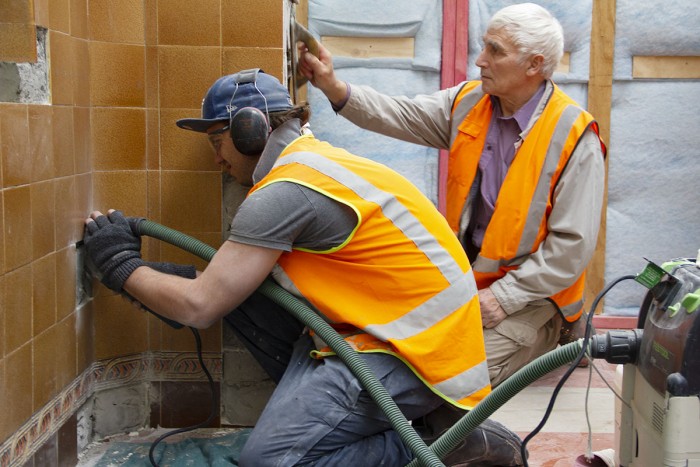Wall and Floor Tiler
Kaiwhakatakoto Taera Pakitara, Taera Papa
Alternative titles for this job
Wall and floor tilers lay ceramic, clay, slate, marble and glass tiles.
Pay
Wall and floor tilers with up to three years' experience usually earn
$24-$25 per hour
Wall and floor tilers with more than three years' experience usually earn
$25-$35 per hour
Source: Tile Association of New Zealand, 2018.
Job opportunities
Pay
Pay for wall and floor tilers varies depending on location, qualifications and experience.
- Apprentice wall and floor tilers usually start on the training minimum wage, with their pay increasing as they gain experience and unit standards.
- Wall and floor tilers with up to three years' experience usually earn between minimum wage and $25 an hour.
- Wall and floor tilers with over three years' experience usually earn between $25 and $35 an hour.
- Those running their own business may earn more than this.
Source: Tile Association of New Zealand, 2018.
- PAYE.net.nz website - use this calculator to convert pay and salary information
- Employment New Zealand website - information about minimum wage rates
(This information is a guide only. Find out more about the sources of our pay information)
What you will do
Wall and floor tilers may do some or all of the following:
- discuss tiling designs and options with clients, and give quotes
- measure and mark surfaces based on plans
- clean and prepare surfaces
- lay liquid waterproof membrane in showers and bathrooms
- make and lay adhesives for tiles to be laid on
- cut, shape and lay tiles
- grout, seal and polish tiles.
Skills and knowledge
Wall and floor tilers need to have:
- knowledge of tiling methods and materials
- the ability to interpret plans and clients' ideas
- ability to calculate tile layout and cut tiles with as little waste as possible
- knowledge of how to use tiling and cutting tools
- knowledge of health and safety regulations.
Self-employed wall and floor tilers also need business skills such as accounting and regulatory compliance.
Working conditions
Wall and floor tilers:
- usually work regular business hours, but may also work weekends and evenings
- work in buildings that are under construction, being altered or renovated
- may work at heights.
What's the job really like?

Andrew Gray
Tiling Director and Operations Manager
Twenty-year career in tiling
Director and operations manager Andrew Gray has worked as a tiler in London, Perth and Melbourne.
Andrew started his career in tiling with an apprenticeship in New Zealand. After working overseas, he came back to NZ and started his own tiling company.
Running a tiling business
Andrew says the advantage of running a tiling business is that it has given him more time to do what he wants, such as spending time with family.
“My staff go and do the jobs, which gives me time to manage everything else.”
However, Andrew says it can be tough managing employees.
“Everyone’s always trying to impress me, and that’s the hard part. Staff management can be tough.
“Every tradesperson is different. They have their own qualities. You have to treat everyone equally and allow them to the job they need to do.”
If you’re thinking about a career in tiling
Andrew’s advice is to make sure you enjoy the profession before training.
“Take your time in deciding what you like. Then try and find a part-time job in the industry. If you realise it’s what you want then think about doing training.”
Wall and floor tiler video
A career in tiling – 1:10 mins. (Video courtesy of BCITO)
There is a lot of colour work and design involved in making the end-result look great and it's a trade where you can show off a bit of creative flair.
This industry suits males and females alike.
Tilers work with a large range of materials including terracotta stone glass and marbled accuracy and keeping things in line is important so tilers need a keen eye for detail and maths skills.
It's physical work so being fit is a must. Work is both indoors and outdoors and tends to involve working in small to medium sized teams, and it's a great opportunity to earn while you learn.
If you have already been working in the trade for some time or if you've been trained and worked professionally overseas BCITO offers excellent opportunities to recognise your skills and get qualified.
This is a great way of providing assurance to your customers that you know what you're doing whilst adding professional credibility to a business.
Check if you're eligible. Getting qualified could be fees-free.
Entry requirements
There are no specific entry requirements to become a wall and floor tiler. However, you can do an apprenticeship and gain a New Zealand Certificate in Trowel Trades Floor and Wall Tiling (Level 4). The Building and Construction Industry Training Organisation (BCITO) oversees apprenticeships.
Secondary education
There are no specific secondary education requirements to become a wall and floor tiler. However, construction and mechanical technologies, and maths are useful.
Year 11 and 12 learners can find out more about the construction industry, and gain relevant skills, by doing a National Certificate in Building, Construction and Allied Trades (Levels 1 and 2) through the BConstructive programme.
For Year 11 to 13 learners, trades academies and the STAR and Gateway programmes are good ways to gain relevant experience and skills.
These programmes may help you gain an apprenticeship, but do not reduce the amount of time it takes to complete it.
Personal requirements
Wall and floor tilers need to be:
- careful, organised, methodical and accurate
- able to follow instructions
- able to work independently and as part of a team
- good at basic maths.
Useful experience
Useful experience for wall and floor tilers includes any building and construction work.
Physical requirements
Wall and floor tilers need to:
- have steady hands and good hand-eye co-ordination
- be comfortable crouching and kneeling for long periods of time.
Find out more about training
- Building and Construction Industry Training Organisation (BCITO)
- 0800 422 486 - info@bcito.org.nz - www.bcito.org.nz
What are the chances of getting a job?
Strong demand for wall and floor tilers
Chances of getting work as a wall and floor tiler are good due to:
- growth in construction activity, which is expected to continue until at least 2023
- building consents forecast to increase until 2024
- a decrease in the number of tilers and apprentices completing Level 4 certificates.
However, like many building jobs, this role can be affected by economic conditions. A downturn in the economy can lower demand for wall and floor tilers.
Shortage of wall and floor tilers
Wall and floor tiler appears on Immigration New Zealand’s construction and infrastructure skill shortage list. This means the Government is actively encouraging skilled wall and floor tilers from overseas to work in New Zealand.
According to the Census, 1806 wall and floor tilers worked in New Zealand in 2018.
Self-employment common among wall and floor tilers
Most wall and floor tilers are self-employed, or run their own small business, usually employing up to five other tilers.
Sources
- Building and Construction Industry Training Organisation, 'Tiling', accessed October 2019, (www.bcito.org.nz).
- Immigration New Zealand, 'Construction and Infrastructure Skill Shortage List', 27 May 2019, (www.immigration.govt.nz).
- Manson, B, manager, Tiling Association of New Zealand, careers.govt.nz interview, August 2018.
- Ministry of Business, Innovation and Employment, 'National Construction Pipeline Report 2019', accessed October 2019, (www.mbie.govt.nz).
- Stats NZ, '2018 Census Data', 2019.
- Westpac, 'A Strong Start to the Year For Construction Sector', 7 June 2019, (www.westpac.co.nz).
(This information is a guide only. Find out more about the sources of our job opportunities information)
Progression and specialisations
Wall and floor tilers may progress to set up their own wall and floor tiling business.
Last updated 25 March 2025

